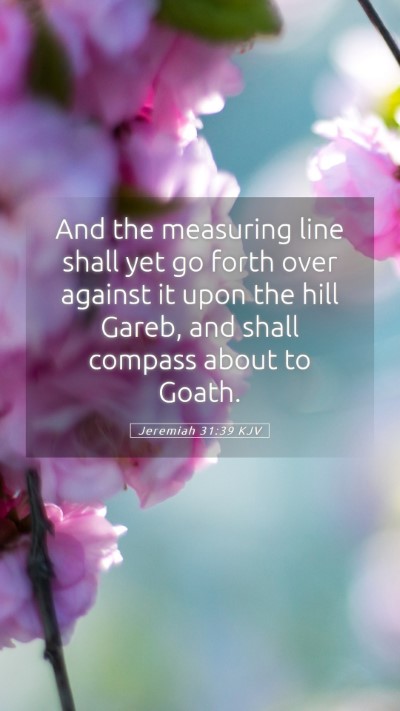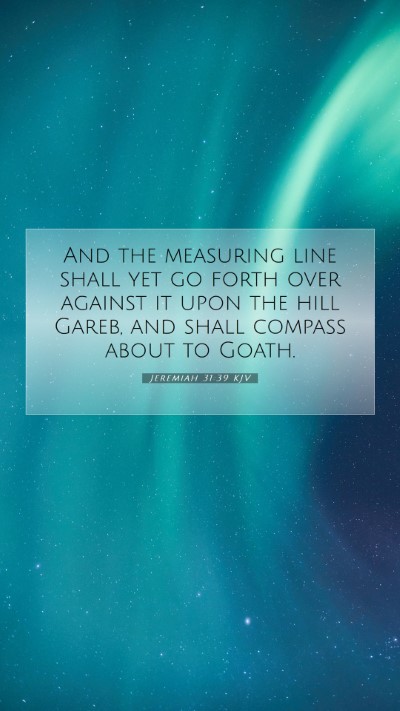Understanding Jeremiah 31:39
Jeremiah 31:39 (KJV): "And the measuring line shall yet go forth over against it upon the hill Gareb, and shall compass about to Goath."
This verse, like many others in the Book of Jeremiah, reflects profound themes of restoration and hope. To gain a comprehensive understanding of its meaning, we can draw insights from public domain commentaries by notable scholars such as Matthew Henry, Albert Barnes, and Adam Clarke.
Context and Overview
Jeremiah, often referred to as the weeping prophet, speaks extensively about the judgment and eventual restoration of Israel. In this passage, God is promising the re-establishment of His people and the rebuilding of Jerusalem after a period of devastation.
Commentary Insights
-
Matthew Henry:
Henry emphasizes that the measuring line symbolizes God's careful planning and restoration. The act of measuring is indicative of a divine blueprint, showing that God knows precisely how to restore His people and their land. The mention of Gareb and Goath signifies specific locations that will witness this restoration, reinforcing that God's promises are tangible and geographical, not merely spiritual abstractions.
-
Albert Barnes:
Barnes highlights the importance of the measuring line as a tool of divine authority, suggesting that it represents God's dominion over the land and His intention to restore order. The geographical markers mentioned are significant, as they denote the scope of God's promise and the precision with which He will act. This serves as a reminder that even in desolation, God has a plan for renewal.
-
Adam Clarke:
Clarke provides historical context, noting that the references to Gareb and Goath remind the readers of the physical landscape of Jerusalem. He explains that these locations were prominent during the time of the Babylonian exile and that the promise of restoration signifies not only spiritual renewal but also physical rebuilding. Clarke's insight underscores the dual nature of God's promises: spiritual rejuvenation alongside tangible, earthly restoration.
Thematic Significance
The themes present in Jeremiah 31:39 resonate deeply with the overall narrative of the Bible. This scripture emphasizes God’s faithfulness and His commitment to His people. Here are a few notable themes:
- Restoration: The promise of rebuilding Jerusalem is pivotal in understanding God’s redemptive plan.
- Divine Authority: The act of measuring conveys that God is in control and will give shape to His creation.
- Hope for the Future: Despite current circumstances, God assures His people of a hopeful future.
Cross References
This verse connects with several other scripture passages that explore similar themes of restoration and hope:
- Isaiah 54:1-3: A call for rejoicing and promises of expansion.
- Ezekiel 40:3-5: The vision of a restored temple with divine measurements.
- Zechariah 1:16-17: God’s promise to return and dwell in Jerusalem.
Applying the Verse Today
Understanding Jeremiah 31:39 in its fuller context encourages readers to reflect on their own lives:
- Personal Restoration: Just as God promised to restore Jerusalem, individuals can find hope for their own personal struggles and challenges.
- Community Impact: The rebuilding of a community is possible when guided by divine principles, encouraging collaboration and unity among believers.
- Faith in God's Promises: This verse serves as a reminder to rely on God's promises, even amidst uncertainty and despair.
Conclusion
In summary, Jeremiah 31:39 is rich with meaning and layered with theological insights. By examining the verse through the lenses of respected commentaries and considering its broader implications, one gains a greater understanding of God’s unwavering commitment to restoration. This understanding not only enhances one’s Bible verse interpretations but also enriches personal faith journeys and community life. As we engage in Bible study groups and online Bible study, let us incorporate these insights for deeper Bible study lessons and discussions.


